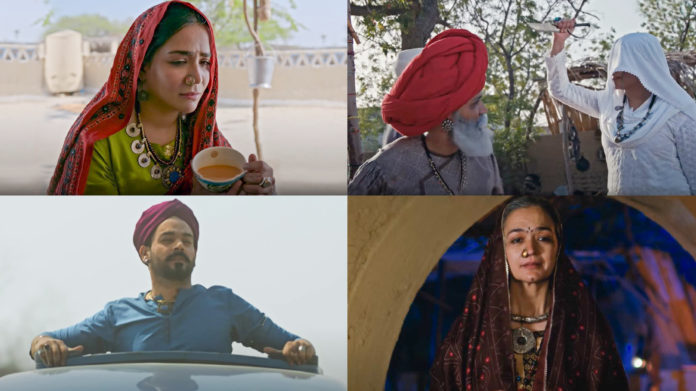Green Entertainment continues to bring untold stories to life that leave the audience awestruck. Its latest addition to the influx of dramas is Jindo, a story of a woman who fights patriarchy and stands against all evil forces, creating waves in a sea dominated by terror and injustice.
The magnus opus world of Jindo is penned by Qurban Ali Rao and brought to life by the director Anjum Shahzad. The drama has a brilliant cast on board including Humaima Malik, Gohar Rasheed, Nazar, Samiya Mumtaz, Saleem Mairaj, and Hajra Yameen.
Jindo is a representation of the inner voice of oppressed women:
There are no sermons or self-righteous lessons in Jindo, but it is the actions that command the plot and send chills down the spine of viewers, making them reflect over the distinction between righteous and evil doing.
The drama opens with a rapid shift in frames as it introduces us to people disguised in red veils, one of which is Jindo, played by Humaima Malik. Exuding majestic glory that commands the screen, these people kill off men ruthlessly. The locals call them Jindo, oblivious to the fact that there is more than one entity other than Jindo.
Jindo is the voice that the people of the desert, especially women never had. She is fighting against the powerful forces that are involved in all kinds of exploitation of humans, treating them like disregarded animals.
A riveting plot that kept us hooked:
The first episode went back and forth from the present to the past to introduce us to Jindo and the local culture and desert area, around which the entire drama is centered. (Spoilers Ahead)
The nucleus of the plot is Jindo, a woman who has had her share of misfortune and sufferings. At the age of two she loses her mother and at the age of five her stepmother leaves her with two siblings, Jugno and Faqeera. Despite being a child herself she raises her step-siblings with utmost love, only to get married off to a powerful man in the village, Dard Sai, at the age of twenty. Jindo is forever scared of the brutality and exploitation she was exposed to as a young girl who marries a monster, adamant to protect her sister from any pain in the future.
Cut to the present day, we are introduced to Sarkar Bibi. A highly respected figure in the village to whom women come for prayers and blessings. But her identity is shielded as she wears a white headscarf covering her face. Our guess is that she is Jindo herself.
With the terror of red veiled people surrounding the village we see the head of the area, Dard Sai (to whom Jindo was married) reach Sarkar Bibi in desperation to find Jindo while the patriarchal evil forces in the village continue their quest of figuring out the whereabouts of Jindo. An elated set of hunters eventually locate her and while trying to capture her are left in shock to find out there are multiple red veiled people, other than Jindo, who protect her.
Near the end of the episode enters Gohar Rasheed who is Dard Sai’s son, equally evil and morally corrupt as his father.
The plot kept the intrigue value intact through the entire episode, unwrapping many plots and raising many questions that curious viewers would tune in to find answers.
Jindo Narrates stories of left out cultures
The drama has an arresting backdrop of a desert area. It is very well shot and intelligently directed which adds to the whole drama.
It is a rare sight for the audience to witness a Rajhistani/Sindhi culture on-screen and be exposed to the local traditions and people through television. We appreciate the storytellers who transcended the stereotypical boundaries and created something out of the box.
The few slips here and there:
Although the first episode was nothing short of amazing, we could not help but notice some oversight by the makers.
Firstly, makers could have taken a step further to add more diversity and inclusivity in the drama by including actors who had command over the dialect and the accent of the locals where the drama is located. Having Punjabi/Urdu speaking actors, takes away the essence that the makers are trying to put forward and dilutes the viewers’ experience as they weren’t able to deliver their dialogues well.
In addition, we also wished there were subtitles added in the drama, in both Urdu and English, for the audience to understand what the characters were saying and leave no room of doubt due to the distinguished accents.
Lastly, if they would have had adopted a clearer way to differentiate between the past and the present, it would have significantly improved the experience of the audience while watching the episode. The flashbacks were added without any mention of time and also without any change in colour grading that would signal the viewers that the timeline has changed.
We acknowledge the effort put in by makers to present this work of art that truly is engaging. Humaima Malik ruled the screen and made her presence felt. We have high expectations from this drama, barring the few flaws.




